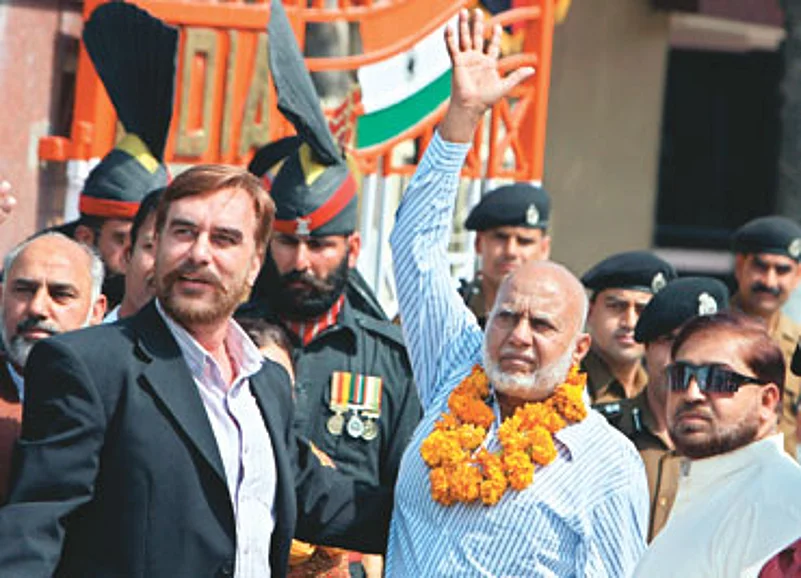
On March 4, Kashmir was released to much jubilation across the Wagah border. Heady with the smell of freedom, and perhaps hoping for compensation from the Indian authorities for his travails, Kashmir declared he had been indeed sent to Pakistan as a spy. Says Burney, "His admission proved he had been rightly charged and sentenced. Had he said he was innocent, it'd have been an embarrassment for Pakistan."
Kashmir's brazen public confession led many to believe Pakistani sentiments had been shrewdly exploited. This perhaps prompted Musharraf to reject the mercy petition of Sarabjit on March 5, believing a reprieve for a person convicted of terrorist attacks would only serve to further roil public sentiments.
The slim hope Sarabjit's lawyer Abdul Hameed Rana had of getting his client off the hook was dashed on March 10, when at the Wagah border arrived the body of Khaled Mehmood, a Pakistani accused of spying in India. The relatives of Khaled claimed his body had torture marks, an allegation the Indian authorities deny saying he died of ill-health in hospital. Truth apart, the anti-India mood hardened in Pakistan. Rana bemoaned to Outlook, "Frankly speaking, India should have reciprocated Kashmir's release by setting free at least a few of the detained Pakistanis to save Sarabjit's life. However, what happened afterwards was simply outrageous. Khaled's body sealed the fate of Sarabjit." (On March 19, India released Jamal Qureshi, a Pakistan acquitted in a fake currency case).
Sarabjit's 30-day reprieve is bound to boost the optimism of many in India. Yet his future is linked to the tit-for-tat nature of Indo-Pak relations. Sarabjit has been convicted of terrorist attacks; an unconditional release for him could not easily win popular endorsement here. So, can India pay a countervailing price to secure his release? Yes, says Asma, swapping prisoners could prove helpful. Burney agrees with a caveat—he's opposed to the exchange of convicted terrorists. Even Sarabjit's wife has been quoted saying she does not favour saving Sarabjit at the cost of repatriating a Pakistani terrorist. On March 20, an Indian minister ruled out the exchange of prisoners.
Punjab home secretary Khusro Pervaiz says Sarabjit could be saved if the families of those killed in the attacks allegedly perpetrated by him grant him pardon. With the hanging of Sarabjit deferred, a window of opportunity has opened for tracking down these relatives.
Asma feels Sarabjit's case has many questions, at the core of which lies the "death penalty itself—and the very finality and morality involved in taking away the life of any human being as a result of the frequently flawed evidence produced each day before courts across the country." She says despite the Supreme Court's attempts to unravel the truth, many questions about the identity of Sarabjit—or Manjit—remains. "If this is really a case of mistaken identity, hanging him would be a gross miscarriage of justice." Perhaps India and Pakistan could agree to exempt each other's citizens facing trial from the death penalty.
Sadly, the Sarabjit episode brings to the fore the true nature of Pak-Indo relations. Says journalist-cum-human rights activist Kamila Hayat, "The mistrust, hostility, deep-lying hatred—the obvious desire of some to see Sarabjit hanged as swiftly as possible—are obviously visible. So too is the storm of propaganda stirred up by the Indian media, taking a blanket line that the Indian national was innocent and the death sentence is merely a manifestation of the hatred for Indians and injustice that exists in Pakistan."

















